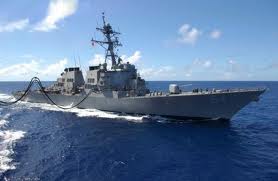This Bloomberg Businessweek article details the advent of convoys-for-hire as a new protective service for merchant vessels transiting the High Risk Area off the coast of Somalia. This new service brings to mind a few serious concerns.
The primary concern is one of jurisdiction. Who will be held responsible for prosecution when a private vessel engages with another private vessel and exchanges fire, causing damage or injury? When a military vessel engages this way the vessel and crew clearly fall under the jurisdiction of the nation from which they hail. Military vessels also follow very strict rules of military engagement. Immunities are even established for military vessels under the U.N. Convention  of the Law of the Sea (UNCLOS, Articles 32 & 95). In the case of a mercenary convoy protection vessel, it could potentially be owned by an owner in one country, operated by someone in a different country, fly the flag of another country, and have crewmembers of any disparate number of locations, just as so many merchant vessels operate throughout the world today. How then do you determine where the case will be tried?
of the Law of the Sea (UNCLOS, Articles 32 & 95). In the case of a mercenary convoy protection vessel, it could potentially be owned by an owner in one country, operated by someone in a different country, fly the flag of another country, and have crewmembers of any disparate number of locations, just as so many merchant vessels operate throughout the world today. How then do you determine where the case will be tried?
Another concern is that under UNCLOS, the actions of a particular private commercial vessel are the responsibility of the Flag State (UNCLOS, Article 94). The problem we face is that the so called Flags of Convenience (FOC) states strive at all junctures to eschew any responsibility related to liability of their vessels. FOC vessels are notorious for taking in the fees associated with flying their nation’s flag and then doing little else to enforce any other international rules or standards. If a mercenary vessel accidentally causes damage to a non-threat and liability attaches to such an attack, will Liberia or Marshall Islands accept this financial responsibility? Based upon recent trends it is unlikely.
One also wonders under whose command these armed mercenary vessels will fall. When armed guards are taken aboard a merchant vessel, international policy dictates that the armed contingents are ultimately under the command of the Master of that vessel. When an independent private vessel, with a Master and armed guards of its own, is employed for protection of another vessel, who is in charge? It would be difficult to imagine a situation where the Master of the protected vessel would maintain any degree of command over the mercenary ship.
And what d oes it cost to hire a ship with military capabilities to follow you through the Gulf of Aden? It cannot be cheap. Ship owners often complain that the cost of a four-man armed security team approaches the point of being cost prohibitive. Some owners even forgo the teams and take their chances because it is so expensive. Fortunately for U.S. flagged vessels that carry U.S. military cargo, the Department of Defense reimburses the cost of armed guards. At around $100,000 per transit through the High Risk Area, the value of this benefit is significant.
oes it cost to hire a ship with military capabilities to follow you through the Gulf of Aden? It cannot be cheap. Ship owners often complain that the cost of a four-man armed security team approaches the point of being cost prohibitive. Some owners even forgo the teams and take their chances because it is so expensive. Fortunately for U.S. flagged vessels that carry U.S. military cargo, the Department of Defense reimburses the cost of armed guards. At around $100,000 per transit through the High Risk Area, the value of this benefit is significant.
At what point does it become more cost effective for owners to simply reflag their vessels under the United States flag, which provides timely information, naval support, and reimbursement for armed guards? Taking into account the increasing severity of the piracy problem one can see where the additional expense associated with flying the American flag may be more easily justified given the protections and diplomatic support associated with it.
